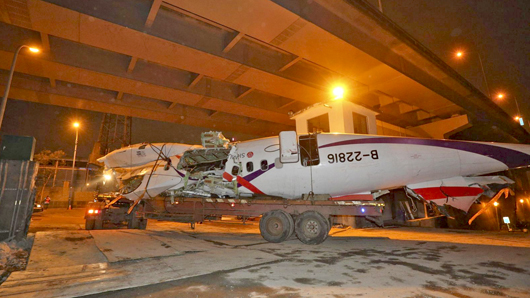Taipei, Feb 6: One of the engines on TransAsia Airways Flight 235 went idle 37 seconds after takeoff, and the pilots may have shut off the remaining engine before attempting to restart them, but the plane crashed before that could happen, Taiwan's top aviation safety official said on Friday.

The details were presented at a news conference in Taipei by Aviation Safety Council Executive Director Thomas Wang as preliminary findings from the flight data recorder.
Wednesday's crash into a river in Taipei minutes after takeoff killed at least 35 people and left eight missing. Fifteen people were rescued with injuries after the accident, which was captured in a dramatic dashboard camera video that showed the ATR 72 propjet banking steeply and scraping a highway overpass before it hurtled into the Keelung River.
Mr. Wang said the plane's right engine triggered an alarm 37 seconds after takeoff. However, he said the data showed it had not shut down, or “flamed out” as the pilot told the control tower, but rather moved into idle mode, with no change in the oil pressure.
Then, 46 seconds later, the left engine was shut down, apparently by one of the pilots, so that neither engine was producing any power. A restart was attempted, but the plane crashed just 72 seconds later.
Mr. Wang said it was too early to draw firm conclusions about the reasons why the engines ceased producing power.
“It's only the third day so we can't say too much,” Mr. Wang said. “We haven't ruled anything out.”
Taiwanese Vice-President Wu Den-yih, mindful of the island's reputation as a tourist destination and its tense relations with China where most of the flight's passengers were from, went to a Taipei funeral parlour for prayer sessions to pay respects.
At the parlour, where bodies are being stored, Mr. Wu expressed condolences and praised pilot Liao Chien-chung, who died in the crash. The pilots may have deliberately steered the plane away from buildings and into the river in the final moments.
“When it came to when it was clear his life would end, (the pilot) meticulously grasped the flight operating system and in the final moments he still wanted to control the plane to avoid harming residents in the housing communities,” Mr. Wu said.
“To the plane's crew, the victims ... I here express condolences,” Mr. Wu added.
Divers with a local fire agency found one female and three male bodies on Friday along the muddy Keelung River bottom about 50 metres from the crash site, a Taipei City Fire Department official surnamed Chen said.
The agency suspects the eight bodies that are still missing may be in equally murky areas and has sent 190 divers to look for them. Taiwan's Ministry of National Defence dispatched three S-70C rescue helicopters to search along a river system that runs into the ocean off Taiwan's northwest coast.
More than 30 relatives of victims cried wildly, prayed or were comforted by Buddhist volunteers at the riverside crash site as divers in black wetsuits brought back the four bodies. Some divers came ashore with their hands joined in prayer for the people they brought back.
The pilot's and co-pilot's bodies were found earlier with their hands still on the controls, Taiwan's ETToday online news service said.
Mr. Wang said the cockpit flight recorder was still being analyzed and a transcript would be provided as soon as possible.
Investigators are to issue a preliminary report on the crash within 30 days and a fuller report within 3-4 months. A final draft will be submitted within 8 months and the full investigation concluded in about a year, Mr. Wang said.
Earl Chapman of Canada's Transportation Safety Bureau told the news conference that the plane's Pratt & Whitney engines were known for their reliability.
“This engine type has millions of flight hours behind it with a very good safety record. So it's fairly unremarkable in that respect,” said Mr. Chapman, who was participating in the investigation because the engines were made by Pratt & Whitney's Canadian division.
The same airline operated another ATR 72 propjet that crashed on an outlying Taiwanese-controlled island last July 23, killing 48.
Taiwan President Ma Ying-jeou's office said on Thursday it was worried that air crashes would damage the island's reputation as a tourist destination.
Thirty-one of the passengers on Flight 235 were from China. Tourists from the mainland to Taiwan rose from a trickle before mid-2008 to a cumulative total of 9.7 million as of last year.
China has claimed sovereignty over Taiwan since a civil war in the 1940s, chilling relations until Mr. Ma took office in 2008 and opened dialogue that led to an agreement allowing tourist visits.
Tourists from China have also died in a construction site accident. A bus crash three years ago in eastern Taiwan injured 34.
The vice president's visit to the funeral home may be a “gesture to keep up benign relations,” said Alexander Huang, strategic studies professor at Tamkang University in Taiwan.
As both sides handle the crash aftermath, a Chinese government minister in charge of Taiwan affairs postponed a visit scheduled for Saturday and Sunday.
The two sides also need more time to discuss four new domestic flight routes that China declared on its own last month, Taiwan's China policymaking body said in a statement. Taiwan opposes the new Taiwan Strait air routes, saying they could cause safety problems for its own domestic flights.





Comments
Add new comment